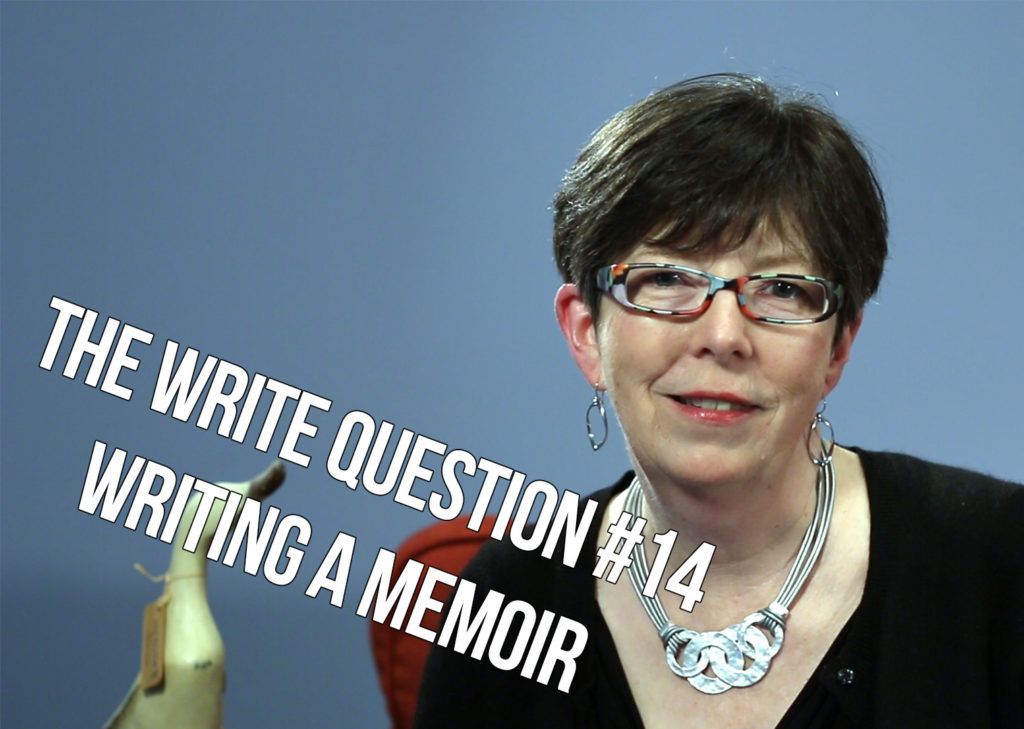Viewing time: 4 minutes 13 seconds
The Write Question is a weekly video podcast about writing that I started in 2017 and that ran, more or less weekly, until April 2022. This is a republication of issue #14, addressing the topic of writing memoir. The post first ran on April 21/17.
Transcript:
Welcome to The Write Question, the video podcast designed to answer your questions about writing. I’m Daphne Gray-Grant.
Today I have a question from reader Oksana Gareeva. Her question was very straightforward. “What are tips for writing an autobiography?”
I think it’s important to clarify something first, Oksana. Amazon.com puts autobiography and memoir in the same category. But there IS a difference between the two genres — an autobiography focuses on the chronology of the writer’s entire life. A memoir, on the other hand, covers one specific aspect of the writer’s life.
I’m not sure which you want to write, both are valuable genres, but it’s important to have a clear sense of what you want to do before you start. And although I haven’t personally written an autobiography, I have written a memoir. Mine focuses on my youth, my family, and our interest and obsession with food. Each chapter features a recipe and one day soon, I intend to give this book to my children.
So, here is my writing advice, based on my experience:
Before you start writing, read as many memoirs as you can. Here are some of my favourites:
- Don’t Let’s Go to the Dogs Tonight by Alexandra Fuller
- The Year of Magical Thinking by Joan Didion
- Just Kids by Patti Smith
- Why Be Happy When You Could Be Normal by Jeanette Winterson
- Autobiography of a Face by Lucy Grealy
- After the Falls by Catherine Gildiner
I’ve put links to all of them below but go to your local bookstore or library and find as many as you can. The more you read in the genre the better understanding you will have.
The next tip is really important. Begin each writing session with a mindmap. Mindmaps will push you away from linear thinking. They could help you uncover long-forgotten stories, find connections, and they will make writing more fun and enjoyable. I can’t think of a better way to give your memory a nudge. If you haven’t already, check out my video on mindmapping, link below.
One of the most important things in a memoir is that it needs dialogue, just like novels do. Now, you may be wondering, “how do I remember dialogue for something that happened years ago?” This can be tricky, and at times you’re going to have to guess at what you said. Even if you’ve kept a diary it won’t include word-for-word conversations so you are going to have to make those up. Try to capture the feeling of what you remember and imagine new dialogue if necessary. I know this sounds phoney, but all memoir writers do this and it does not mean you are writing fiction.
Remember that human beings generally have unreliable memories. I’ll link below to an interesting New Yorker piece on the science of memory. If you show a draft of your book to family members, they may object that they remember things differently. That’s fine, this is your book, your remembrances and if anyone else wants to tell their side of the story, well, tell them they’re welcome to write their own book, too.
On the other hand, be aware that you’ll want to protect non-family members, and, in fact, you may be legally required to do so. When I briefly thought about publishing my book, I went and changed the names and the physical description of everyone who wasn’t a family member. Now, because it’s not being publishes, I’ve changed it back to the real names.
Despite all the work, I found writing a memoir to be enjoyable. It’s fun to think back to what happened earlier in your life — sort of like looking at photo albums but, doing it based entirely on your own memory.
Finally, let me wrap up with some excellent advice from Dani Shapiro, author of the memoirs Slow Motion and Devotion. “If you write a memoir, it can’t be about blame or hurt; it has to be creative.”
Thanks for your question, Oksana. Good luck with putting the story of your life into words.
Thanks so much for watching. And don’t forget to like and subscribe to the video.
Links:
New Yorker article on memory: “You have no idea what happened”
Don’t Let’s Go to the Dogs Tonight by Alexandra Fuller.
The Year of Magical Thinking by Joan Didion.
Just Kids by Patti Smith
Why Be Happy When You Could Be Normal by Jeanette Winterson.
Autobiography of a Face by Lucy Grealy.
After the Falls by Catherine Gildiner.
Slow Motion by Dani Shapiro
Devotion by Dani Shapiro


